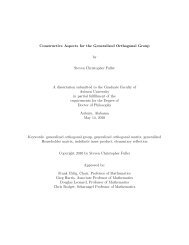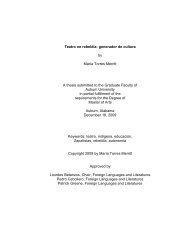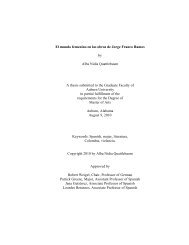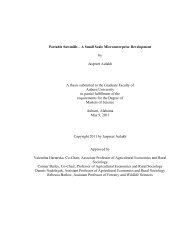the trouble with gender in othello - Auburn University Electronic ...
the trouble with gender in othello - Auburn University Electronic ...
the trouble with gender in othello - Auburn University Electronic ...
You also want an ePaper? Increase the reach of your titles
YUMPU automatically turns print PDFs into web optimized ePapers that Google loves.
But he, sir, had th’ election;<br />
And I, or whom his eyes had seen <strong>the</strong> proof,<br />
At Rhodes, at Cyprus, and on o<strong>the</strong>r grounds […]<br />
He, <strong>in</strong> good time, must his lieutenant be,<br />
And I—God Bless <strong>the</strong> mark!—His Moorship’s<br />
Ancient. (I.i.9-34)<br />
A man’s job, his “place,” is an <strong>in</strong>tegral part of his <strong>gender</strong> performance. O<strong>the</strong>llo<br />
has not only (possibly) emasculated Iago through adultery <strong>with</strong> his wife, O<strong>the</strong>llo<br />
has also passed over Iago for promotion, endangered his job. For a man as<br />
<strong>in</strong>vested <strong>in</strong> his career as Iago, this could be as horrific an emasculation, as much<br />
of an attack on Iago’s <strong>gender</strong> performance as a Venetian man, as any adultery. 6<br />
As Butler writes, “It would be wrong to th<strong>in</strong>k that <strong>the</strong> discussion of ‘identity’<br />
ought to proceed prior to a discussion of <strong>gender</strong> identity for <strong>the</strong> simple reason<br />
that ‘person’s only become <strong>in</strong>telligible through becom<strong>in</strong>g <strong>gender</strong>ed <strong>in</strong> conformity<br />
<strong>with</strong> recognizable standards of <strong>gender</strong> <strong>in</strong>telligibility”(Butler 16). Identity is<br />
<strong>in</strong>separable from perceived <strong>gender</strong>, <strong>gender</strong> is <strong>in</strong>separable from <strong>gender</strong><br />
performance, and for ei<strong>the</strong>r O<strong>the</strong>llo or Iago, and <strong>the</strong>ir <strong>gender</strong> performance is<br />
<strong>in</strong>separable from <strong>the</strong> <strong>gender</strong> performance of “<strong>the</strong>ir” women.<br />
Karl Zender posits an <strong>in</strong>terest<strong>in</strong>g <strong>the</strong>ory regard<strong>in</strong>g Iago’s motivations<br />
that are not <strong>in</strong>compatible <strong>with</strong> my own, argu<strong>in</strong>g after a close read<strong>in</strong>g of <strong>the</strong><br />
dockside encounter that a primary motivation is Iago’s humiliation at<br />
31
















